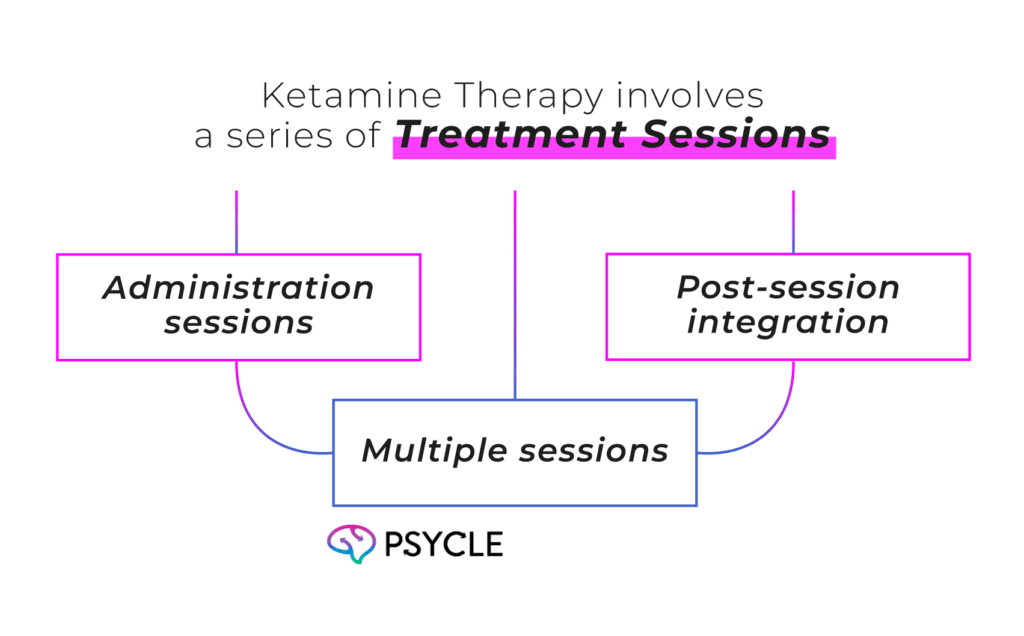Ketamine therapy is an innovative treatment for various mental health conditions. Before starting ketamine therapy, it is essential to understand the effects and therapy process of ketamine. Research its effects on mental health conditions such as depression, anxiety, and PTSD. Familiarize yourself with the therapy process and what to expect during the sessions.
Key Takeaways
- Ketamine therapy offers rapid relief for depression and other mental health conditions.
- Consultation with a healthcare professional is essential to assess suitability and mitigate risks.
- Mindfulness and meditation practices can enhance the therapy experience.
- Setting clear intentions and goals helps guide the therapeutic journey.
- Support from loved ones and logistical planning are crucial for a successful therapy experience.
- Formal integration therapy and personal integration aid in processing and applying insights from ketamine experiences.
Understand Ketamine: Effects and Therapy Process
Benefits of Ketamine Therapy
Ketamine therapy has gained recognition for its remarkable ability to alleviate symptoms of depression and other mental health conditions over the past decade.
Unlike antidepressants, which may take weeks or even months to show their effects, ketamine is rapid-acting, offering much-needed relief to individuals in distress. The therapeutic effects of ketamine tend also to be longer-lasting than conventional medication, with a single dose lasting up to two weeks.
To date, clinical trials have highlighted the effectiveness of ketamine in the treatment of depression, suicidal ideation, substance abuse disorder, anxiety, and post-traumatic stress disorder (PTSD).
Scientists think ketamine’s therapeutic effects may be explained by its ability to increase neuroplasticity – the ability of the brain to reorganize itself by forming new neural connections. This effect may help ketamine therapy patients overcome negative thoughts and behavior patterns.
The Ketamine Therapy Process
When embarking on ketamine therapy, it is crucial to understand the therapy process and what to expect during the sessions. The typical ketamine therapy process involves the following steps:
- Initial assessment: Your healthcare professional will assess your medical history, current mental health condition, and treatment goals to determine if ketamine therapy is appropriate for you. An individualized treatment plan tailored to your specific needs will then be developed This plan may include details about the frequency of your ketamine treatments, your dosages, the anticipated duration of your therapy, and any additional treatments or therapies. Ketamine therapy typically involves a series of treatment sessions.
- Administration sessions: Ketamine therapy typically involves a series of treatment sessions During a dosing session, ketamine is typically administered intravenously but can also be delivered intranasally. The administration route will be determined based on your individual needs and preferences. Each ketamine therapy session typically lasts between 60 to 90 minutes, allowing sufficient time for the medication to take effect and facilitate therapeutic experiences. During the therapy sessions, a healthcare professional will closely monitor your vitals and overall well-being to ensure your safety and optimize the treatment’s effectiveness.
- Post-session integration: Following each therapy session, it is essential to have time for integration and reflection. This can involve discussing your experiences with a therapist or engaging in self-reflection to process the insights gained during the session.
- Multiple sessions To maximize the therapeutic benefits of ketamine, multiple sessions are usually recommended. The frequency and number of sessions will depend on your specific treatment plan and individual response to the therapy.

Physical & Mental Health: Consult with Your Doctor
Your doctor possesses the medical knowledge and expertise necessary to evaluate your overall health and determine if ketamine therapy is a suitable treatment option for you. They will assess your pre-existing conditions and any medications you are currently taking to gauge compatibility with ketamine therapy.
It’s recommended that Individuals with cardiovascular issues such as uncontrolled hypertension or recent heart attacks are not considered good candidates for ketamine therapy. Ketamine has the potential to increase blood pressure and heart rate, which can pose risks for those with compromised cardiovascular health.
This includes those with hypertension, tachycardia, arrhythmias and previous or family history of ischemia and cardiac arrest.
Individuals with a personal or family history of psychotic disorders, such as schizophrenia or bipolar disorder with psychosis, are also not recommended for ketamine therapy. This is because ketamine temporarily induces psychotic-like symptoms, such as dissociation and hallucinations, which could potentially exacerbate psychosis or trigger a psychotic episode.
Those actively experiencing substance abuse are also generally recommended against ketamine treatment because of its addictive potential.
You can find out more about treatment considerations for ketamine therapy on this American Psychiatric Nurses Association webpage.
Mental Prep: Mindfulness and Meditation
Preparing your mind for ketamine therapy is an important aspect of the treatment journey. Engaging in mindfulness or meditation practices can help create a positive mental state that may improve your overall ketamine therapy experience. These practices can also help you develop the skills to navigate any thoughts or emotions that may arise during the session.
Consider integrating mindfulness exercises or guided meditation into your daily routine. To practice mindfulness meditation, find a quiet space to sit comfortably with your eyes closed. When thoughts arise, re-direct your attention to the sensations of breath. Y
ou can start small, practicing for five minutes daily and gradually increasing to longer sittings.

Set Intentions for Therapy
Before beginning ketamine therapy, it is essential to set intentions or goals for the treatment. By defining what you hope to achieve, you can provide a sense of focus and direction during your therapy sessions. Take the time to reflect on the improvements or changes you would like to see in your daily life.
This could include improved relationships, increased gratitude for life, more motivation, or reduced depression and anxiety symptoms.
Whatever your intention, having clear goals will help guide your journey towards desired outcomes. Physically writing these goals down in a journal or on a piece of paper will help consolidate them. As you progress through your treatment, you can reflect on your progress towards these goals. Your intentions may even evolve as you gain more insights from the treatment.
Support System: Inform Loved Ones
Embarking on ketamine therapy can be a transformative journey, one that can be made smoother with the support of trusted friends and family. Informing your loved ones about your decision to undergo ketamine therapy is an important step in creating a strong support system throughout your healing process.
Additionally, loved ones can play a significant role in practical aspects of your ketamine therapy journey. They can assist with transportation to and from therapy sessions, ensuring you have a reliable means of getting to the clinic and returning safely home afterward. This can relieve any stress or logistical concerns, allowing you to focus entirely on your healing experience.
Logistics: Arrange Transportation
Ketamine can temporarily impair your cognition and coordination, making it unsafe to drive immediately after the therapy. Your priority should be ensuring your safety and the safety of others, so planning is essential.
You should have someone to accompany you to your sessions and drive you home afterward. This ensures that you have support and assistance in case the effects of ketamine persist beyond the session.
Follow-Up: Integration Therapy Sessions
Integration therapy sessions play a vital role in the overall ketamine therapy process. These sessions provide a dedicated space for individuals to process and integrate their ketamine experiences and insights.
By working with a trained therapist, patients can solidify the positive changes resulting from their ketamine therapy and address any challenges or questions that may arise post-therapy.
Integration therapy is also designed to support individuals’ journey toward improved mental health and well-being. In these sessions, patients have the opportunity to explore and understand the meaning behind their ketamine experiences, gain a deeper understanding of themselves, and develop coping mechanisms to navigate their day-to-day lives.
Alongside formal integration sessions, consider doing your own personal integration. This may include journaling and speaking to loved ones about your experiences and insights. You could also try expressing your thoughts and emotions through art, music, and movement.
A final thing you can consider in integration is attending a Psychedelic Integration circle. This is a supportive group setting where individuals come together to process and discuss their altered state journeys, including challenges and the impact this has had on their wellbeing.
FAQs
How Should I Prepare for Ketamine Therapy?
To prepare for ketamine therapy, consult with a healthcare professional to assess your suitability and discuss treatment goals. Engage in mindfulness practices to cultivate a positive mental state and set intentions for the therapy. Inform trusted loved ones about your decision and arrange transportation for your sessions to ensure safety and support.
What Should I Consider Regarding My Physical Health Before Starting Ketamine Therapy?
It is important to consult with your doctor and discuss any pre-existing medical conditions or medications you are taking. Ketamine therapy may not be suitable for everyone, and your doctor can assess your overall health to determine if it is a viable treatment option for you.
Integration therapy sessions are an essential part of the ketamine therapy process. These sessions provide an opportunity to process and integrate the experiences and insights gained during the ketamine therapy sessions. They can help solidify the positive changes and help navigate any challenges or questions that may arise post-therapy.
How Can I Mentally Prepare for Ketamine Therapy?
Engaging in mindfulness or meditation practices before starting ketamine therapy can help prepare your mind for the experience. Consider incorporating mindfulness exercises or guided meditation into your daily routine to establish a sense of inner peace and readiness for the therapy sessions. Physical exercise and having a healthy diet are also conducive to creating a positive mind state.
What Are the Effects of Ketamine and How Does the Therapy Process Work?
Ketamine is a dissociative anesthetic that targets glutamate receptors in the brain, leading to rapid-acting antidepressant and anti-anxiety effects. The therapy process typically involves intravenous or intranasal administration of ketamine in a controlled setting, under the supervision of a healthcare professional. Multiple sessions are usually recommended to maximize the benefits of ketamine therapy.

